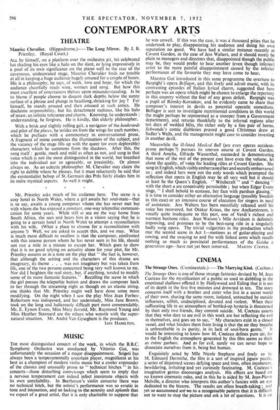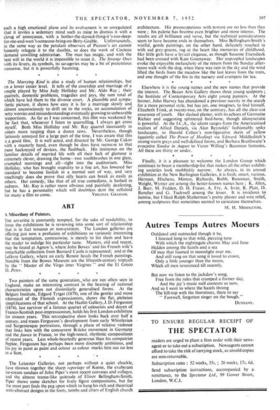CINEMA
The Strange Ones. (Continentale.)—The Marrying Kind. (Carlton.) The'Strange Ones is one of those strange fantasies devised by M. Jean ,Cocteau for the mystification of a public so used to dabbling in the emotional shallows offered it by Hollywood and Ealing that it is out of its depth in the first five minutes and drowned in ten. The story concerns itself with a brother and sister who live in a secret world of their own, sharing the same room, isolated, untouched by outside influences, selfish, undisciplined, devoted and violent. When their suffocating life in an atmosphere of bottled-up hysteria is threatened by their only two friends, they commit suicide. M. Cocteau asserts that they who dare to see evil in this work are but reflecting the evil in themselves, and goes on to say, " My characters exist in a closed vessel, and what hinders them from living is that the air they breathe is unbreathable in its purity, in its lack of soul:born germs." It would be interesting to know how M. Cocteau defines pure air, for to the English the atmosphere generated by this film seems as thick as crime garbure. And as for evil, surely we can never hope to dissociate ourselves from it, being but human.
Exquisitely acted by Mlle Nicole Stephane and finely so by M. Edouard Dermithe, the film is a sort of inspired jigsaw puzzle, a series of disjointed scenes defying space and time, often incoherent, bewildering, irritating-1nd yet curiously fascinating. M. Cocteau's imaginative genius discourages analysis. His effects are based on no known cinematic rules, and in this he is aided by M. Jean-Pierre Melville, a director who interprets this author's fancies with an eye dedicated to the bizarre. The results are often breath-taking ; and yet so accustomed are' we te a recognisable pattern that it is difficult not to want to stop the picture and ask a lot of questions. It is on
such a high emotional plane and its evolvement is so unregulated that it invifes a sedentary mind such as mine to dismiss it with a shrug of annoyance, with a bother-the-darned-thing-it 's-too-deep- for-me-and-won 't-someone-bring-on-Betty-Grable. Unfortunately, in the same way as the petulant observers of Picasso's art cannot honestly relegate it to the dustbin, so does the work of Cocteau demand unwilling admiration. The man has magic, and with the best will in the world it is impossible to resist it. The Strange Ones with its fevers, its symbols, its savageries may be a bit of pretentious nonsense, but it is powerfully haunting.
• • •
The Marrying Kind is also a study of human relationships, but on a lower cosier level. It tells of the courtship and marriage of a couple played by Miss Judy Holliday and Mr. Aldo Ray ; their quarrels, domestic problems, tragedies and joys, the sum total of which have led them to the divorce court. A plausible and sympa- thetic picture, it shows how easy it is for a marriage slowly and almost unconsciously to drift on to the rocks, an accumulation of petty worries and misunderstandings eventually growing to unbearable proportions. As far as I was concerned, this film was weakened by :he fact that, whenever I listen to quarrelling, I always get cross :nyself. Both Miss Holliday and Mr. Ray quarrel incessantly in voices more rasping than a dozen saws. Nevertheless, though furiously annoyed for a large part of the time, I was aware that this is a good film. It is well acted, and directed by Mr. George Cukor with a masterly hand, even though he does have recoil se to that most hackneyed of devices, the flashback. His insistence on the familiar details of married life with all their lack of glamour is extremely clever, drawing the home—two toothbrushes in one glass, crumpled mornings and all—right into the auditorium. Miss Holliday, who has brought stupidity to a fine art, has lowered her standard to become foolish in a normal sort of way, and very touchingly does she prove that silly hearts can break as easily as others. Her comedy, like that of all true comedians, is bathed in sadness. Mr. Ray is rather more obvious and painfully deafening, but he has a personality which will doubtless dent the celluloid



































 Previous page
Previous page